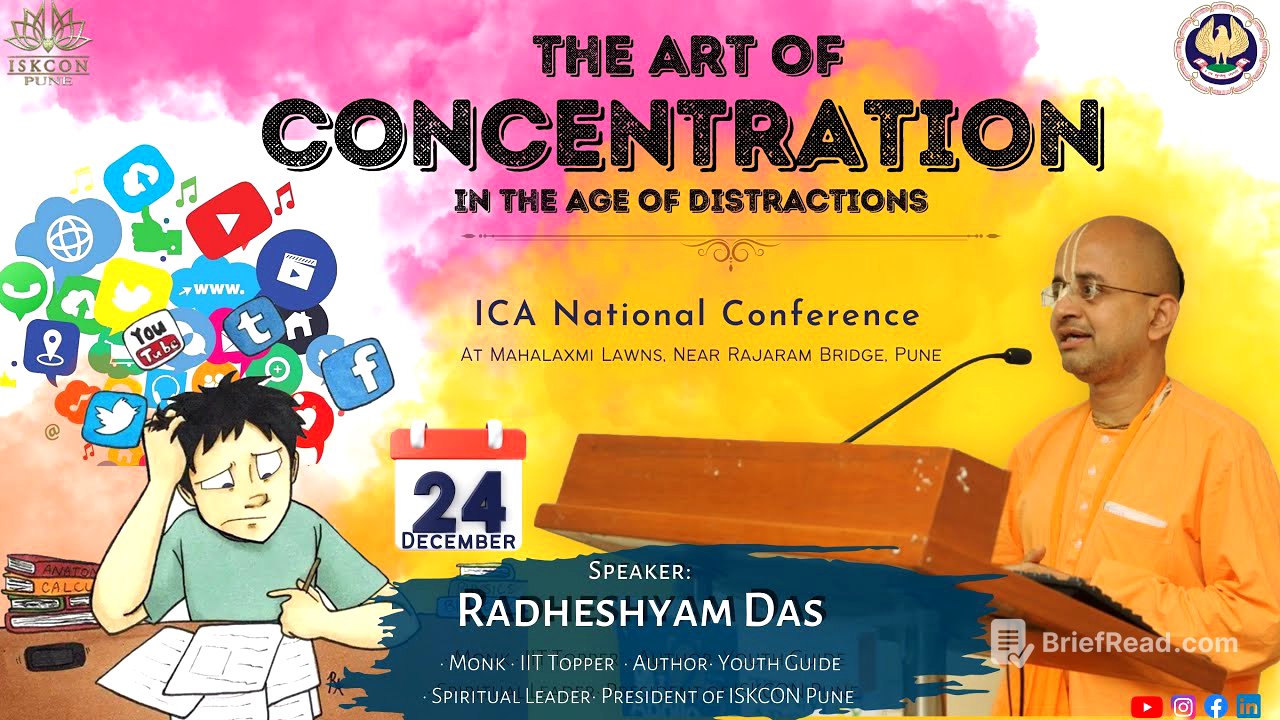TLDR;
This YouTube video features a lecture on the topic of concentration, particularly in the context of avoiding distractions. The speaker uses analogies such as a dam versus a flood and a trained elephant versus a wild elephant to illustrate the importance of regulating the mind and conserving energy. He introduces the concepts of attraction, attention, absorption, and awareness as key components of concentration. The lecture also touches on the significance of purity in habits—eating, sleeping, mating, and defending—for achieving a calm and focused mind. The ultimate goal is to connect with a larger purpose in life and find lasting happiness through spiritual awareness.
- The mind should be regulated like a dam, not a destructive flood.
- Train your mind like an elephant to be constructive, not destructive.
- Cultivate good habits and avoid bad ones to maintain a calm mind.
- Focus on attraction, attention, absorption, and awareness for concentration.
- Purify habits related to eating, sleeping, mating, and defending.
Introduction [0:01]
The speaker begins by expressing gratitude to the organizers for the opportunity to share insights on the topic of the mind and concentration. He acknowledges the significance of the event and the audience of students.
Mind as Dam vs. Flood [0:21]
The speaker compares the mind to a dam and a flood, illustrating that both possess energy, but a dam is constructive (potential energy), while a flood is destructive (kinetic energy). He emphasizes the importance of making the mind like a dam to conserve and regulate energy, using it purposefully. Negative emotions like anger and greed drain energy, and modern distractors, such as social media, exacerbate this issue. The speaker uses the example of a millionaire with a heart problem who is affected by stock market fluctuations to illustrate how greed drains energy.
Mind as Trained vs. Mad Elephant [4:34]
The speaker compares the mind to an elephant, which can be either constructive or destructive depending on whether it is trained or wild. A trained elephant is friendly and helpful, while a wild elephant can be dangerous. He quotes Arjuna from the Bhagavad Gita, who describes the mind as powerful and difficult to control. Lord Krishna responds that the mind can be used for elevation or degradation, similar to how a knife can be used by a surgeon or a murderer.
Desires and Habits [8:24]
The speaker discusses the role of desires, noting that it is not wrong to have desires, but it is detrimental to become a slave to them. He uses the example of a smartphone, which is intended to be a servant but can become a distraction. He highlights the importance of cultivating good habits, which, when repeated, become second nature. He shares his personal morning routine as an example of a good habit that has become effortless.
One Thing at a Time [11:14]
The speaker emphasizes the importance of doing one thing at a time, such as eating while eating and studying while studying. He uses the analogy of pouring oil from one vessel to another, requiring seamless concentration. He notes that modern society encourages multi-processing, which reduces the quality of work.
Three Components of Concentration [13:52]
The speaker identifies three components of concentration: attraction, attention, and absorption. Attraction is the initial interest in a subject, attention is focusing on it, and absorption is being fully immersed in the task. He defines distraction as alternative attraction and emphasizes the need for discipline and determination to stick to a plan.
Determination and Purity [16:29]
The speaker explains that determination and willpower are essential for maintaining discipline. He introduces Sanskrit terms like "dharana Shakti" (ability to grasp), "viveka buddhi" (ability to discriminate), and "smriti Shakti" (ability to recollect). He connects these qualities to celibacy or "brahmacharya," which involves maintaining purity in eating, sleeping, mating, and defending.
Purity in Habits [18:54]
The speaker elaborates on the importance of purity in four key habits: eating, sleeping, mating, and defending. He advises eating foods that purify and calm the mind, such as vegetarian foods, and avoiding junk food. He recommends sleeping early and rising early, aligning with the sun's cycle. He also discusses the importance of avoiding illicit relationships and maintaining purity in marital relations. Lastly, he advises against greed and unhealthy comparisons with others.
Soul, Mind, and Body [24:56]
The speaker explains the relationship between the soul, mind, and body. The soul is the real person, the mind stores desires, and the body executes them. He emphasizes the importance of understanding how the mind functions to attain concentration. He distinguishes between a calm mind and an agitated mind, noting that a calm mind is necessary for concentration.
Regulation and Meditation [28:26]
The speaker discusses the importance of regulating desires and avoiding activities that agitate the mind, using the acronym GIMI (gambling, illicit sex, meat-eating, intoxication). He recommends meditation and prayer as powerful tools for calming the mind. He emphasizes the need to bring the mind to a steady state to achieve one-pointed concentration.
Attraction, Attention, Absorption, and Awareness [35:19]
The speaker concludes by revisiting the four components of concentration: attraction, attention, absorption, and awareness. He stresses the importance of developing attraction for what you want to focus on, associating with those who share that attraction, and being fully absorbed in the task. Awareness involves understanding the purpose behind what you are doing, acting with full consciousness, and seeing the larger picture of life.
Questions and Answers [45:59]
The speaker addresses questions from the audience, including how to overcome regret and how to prioritize tasks. He distinguishes between lamentation (a downward spiral) and regret (a learning opportunity). He advises making priorities based on universal principles and balancing family, professional duties, and devotion to God.
Purpose of Life [52:37]
The speaker elaborates on the purpose of life, drawing from the Taittiriya Upanishad. He describes five stages of understanding, culminating in the realization that the goal of life is to awaken love for God and all beings. He shares an English slogan: "May the wicked become virtuous, may the virtuous become tranquil, may the tranquil become free, may the free set others free."
Conclusion and Gratitude [56:02]
The speaker is thanked for his enlightening words and is recognized for his various achievements and roles within ISKCON. He extends an invitation to visit the ISKCON temple in Katraj, Pune, and expresses gratitude to the organizers for including a spiritual component in the event. He reiterates key points from his lecture, emphasizing the importance of regulating the mind, cultivating good habits, and focusing on one thing at a time.









